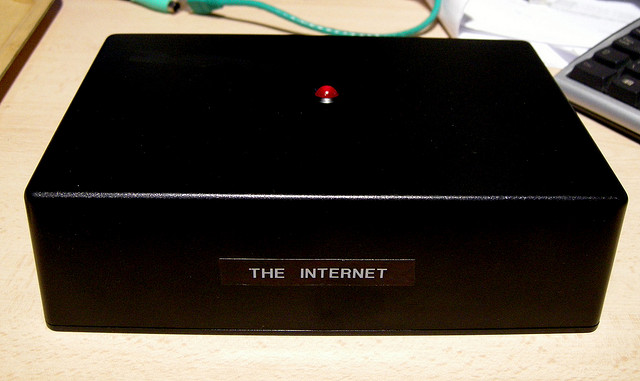How do we end political alienation? Get rid of parties, papers and point-scorers
Is British democracy beyond salvation? Adam Lent argues that political alienation is an inevitable result of the defects of our political system, but that there is potential for improvement and reform in making politics more like the internet, reforming political parties, and changing the ‘point scoring’ nature of political discourse. Unfortunately, none of these look remotely likely in the near future.
What if the World Wide Web had been invented in 1949 instead of 1989?
My guess is it would have taken much, much longer to get to the Web 2.0 stage. The huge explosion in on-line interactivity is based on a popular mind-set which rejects passive consumption, believes everyone has something valuable to share and revels in creativity. Moises Naim labels it the “mentality revolution”. It’s a big part of what the RSA calls the “power to create”. And it’s an outlook that has its roots in the social changes of the 1960s. The post-war generation just wouldn’t have ‘got’ the internet in the same way.
The internet is so good at releasing the ‘power to create’ because of its capacity to ‘disintermediate’. Those elite bodies that usually control what gets published, manufactured and funded are losing power at an astonishing speed as readers, customers, entrepreneurs secure direct access to writers, companies and investors. And key to making this disintermediation work is the power of the web to ‘aggregate’ and create platforms where users can choose from a vast pool of options to shape what gets read, bought and funded.
Making politics more like the internet
This is hugely relevant for the popular alienation from politics. Unlike the web, politics is jam-packed with intermediaries (ministers, MPs, Spads, officials, researchers, councillors, mayors, think tanks) and is run by platforms (political parties and large media outlets) where agendas are shaped in ways that are utterly alien and bemusing to the great majority.
Most discussion about politics and the internet focuses on how MPs and others can better use the internet to ‘engage’ with voters. This misses the point. The key question to ask is: how can politics be more like the internet so that it better reflects the expectations of a generation that loves the web?
Answering this would mean disintermediating politics and ensuring that genuine aggregation occurs. Innovations like NHS Citizen give a hint of what that might involve. NHS Citizen has been designed to ‘discover’ what issues are genuinely concerning people about healthcare, provide a ‘gather’ process where those issues can be debated more deeply and get aggregated into an agenda, and then call an ‘assembly’ where representatives can hold the NHS England executive officers to account in line with that agenda.
NHS Citizen does make wide use of the internet. But this is far less important than the fact that it reflects the spirit of the internet. It is deliberately designed to create agendas and ultimately decisions that are not shaped by layers of intermediaries and where aggregation is as neutral as possible to reflect what people really care about.
Politics without parties, papers and point-scorers
Thinking about what such an ethos might mean for national politics shows how far we have to go to create a system that overcomes deep seated alienation.
It would be a world free of political parties which claim to be the great aggregators of the system but whose agendas, in reality, are deeply shaped by the ideological prejudices of activists and MPs and the self-interested calculations of their leaders.
The big media outlets that have such a grip (despite shrunken circulations and ratings) on political agendas and decisions would be far less important than spaces (probably mostly on-line) where citizens discussed issues directly with each other without the benefit of columnists and editorials.
And Parliament would be a place where MPs meaningfully navigated their way through to a consensus built around the considered views of citizens rather than follow the whips into lobbies while playing tiresome political games designed to get a grip on diminishing state power.
No chance of change
There is not the slightest chance such a system will ever be created willingly by the political class. They are invested far, far too much – materially, intellectually and emotionally – in the current system. This means two things.
Firstly, mass alienation from politics is here to stay for a very long time. The idea that making PMQs less boisterous or introducing primaries is going to make any difference is clearly ludicrous. In fact, the whole conventional constitutional reform agenda (elected House of Lords, written constitution, PR etc.), probably has no bearing on ending popular alienation in the light of Naim’s mentality revolution.
Secondly, change of this sort – what might be called ‘creative democracy’ – is only going to emerge gradually in different public spaces such as the NHS, the police service and local authorities. Then there might come a point at which national politics is so degraded by having lost power to institutions with much more meaningful mandates for its decisions that it has no choice but to change.
—
Note: this post originally appeared on the RSA blog and can be found here. It represents the views of the author, and not those of Democratic Audit or the LSE. Please read our comments policy before posting. The shortened URL for this post is: https://buff.ly/1oTDRij
—
 Adam Lent leads the RSA’s Action and Research Centre – the ‘think and do tank’ at the RSA. I’ve also worked for the TUC, the Power Inquiry, Sheffield University and freelanced as a researcher for a while. A lot of this blog deals with my current obsession: entrepreneurialism, micro-business and new technologies.
Adam Lent leads the RSA’s Action and Research Centre – the ‘think and do tank’ at the RSA. I’ve also worked for the TUC, the Power Inquiry, Sheffield University and freelanced as a researcher for a while. A lot of this blog deals with my current obsession: entrepreneurialism, micro-business and new technologies.






 Democratic Audit's core funding is provided by the Joseph Rowntree Charitable Trust. Additional funding is provided by the London School of Economics.
Democratic Audit's core funding is provided by the Joseph Rowntree Charitable Trust. Additional funding is provided by the London School of Economics.
prada outlet
https://www.jordanshoesforsale-cheap.com jordan shoes for sale How do we end political alienation? Get rid of parties, papers and point-scorers : Democratic Audit UK
nike store
https://www.guccioutlethandbags4u.com gucci outlet How do we end political alienation? Get rid of parties, papers and point-scorers : Democratic Audit UK
nike high heels online
https://www.pradahandbagsoutlet2013.com prada outlet How do we end political alienation? Get rid of parties, papers and point-scorers : Democratic Audit UK
ferragamo outlet
https://www.nikeoutlet-airmax.com nike air max How do we end political alienation? Get rid of parties, papers and point-scorers : Democratic Audit UK
louis vuitton outlet
https://www.guccioutlethandbags4u.com gucci bags How do we end political alienation? Get rid of parties, papers and point-scorers : Democratic Audit UK
prada outlet
https://www.celinehandbagsbuy.com celine handbags How do we end political alienation? Get rid of parties, papers and point-scorers : Democratic Audit UK
How do we end political alienation? Make politics work like the internet…mmm possibly https://t.co/Z1jHqAcV3C
Turnout Probs? “Make Politics more like the Internet!” https://t.co/voWOtalKE1 (but 90-9-1 rule disallows abolishing parties) @wahl_de
How do we end political alienation? Get rid of parties, papers and point-scorers https://t.co/Ct6Tb3xGeC
The best argument against internet democracy is five minutes spent reading the comments underneath an average YouTube video.
How do we end political alienation? Get rid of parties, papers and point-scorers https://t.co/8GpUkdHIvg says @adamjlent
If we are going to use IT Crowd references to make our case, then I think this is the main reason why internet-based mass aggregation projects won’t work as well as representative government: https://paulcairney.wordpress.com/2013/08/17/a-brief-guide-to-meeting-people-at-conferences-and-on-twitter/
How do we end political alienation? Get rid of parties, papers and point-scorers https://t.co/fFTRxsZAKr